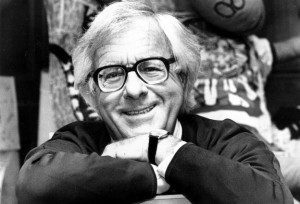When I Heard the Learn’d Astronomer
After that stellar Ozymandias recital in the last teaser, I just had to hear more Breaking Bad poetry. Before you interject, “but, Rico…Breaking Bad isn’t science fiction,” permit me to beseech you, on this day to bite me. Chemistry is science. So there.
Horrible Poetry 101: Arise and Sing
SPOILER WARNING: If you have not seen Dr. Horrible’s Sing-Along Blog, do NOT read this post or watch the above video! Go watch it somewhere else, and then come back. Trust us. You don’t want to ruin it.
Dispelling some myths
While we at WWEnd are passionate about what we do, we also have day jobs. I mention this because it sometimes surprises people who think we are some big corporate entity that provides services for promotional purposes (we’re not really sure whether to be flattered by that). My day job is English teacher. I spend a lot time teaching Shakespeare, Shelly, Keats, Frost and pretty much any other English language poet to my students. I have high standards for them, and lyric poetry can be quite intimidating. Consequently, I have tried to dispel the notion that poetry is hard to read or that the literary figures I teach them to identify can only exist in elite centuries-old verse. In fact, I maintain that every trope and scheme tested in an AP English exam can be found in contemporary entertainment ranging from Top 40 music to popular musicals.
…which is what gave me the idea to use Joss Whedon’s most excellent Dr. Horrible’s Sing-Along Blog to teach poetry. I’m just at the beginning stages of lesson planning at the moment, but I have finished an analysis of the Sing-Along Blog’s final song, Everything You Ever.
They Have Not Seen the Stars
Ray Bradbury is known especially for his short stories and novels that blur the line between fantasy and horror, but not everyone knows that he published a collection of poetry (with nearly 500 pages of verse!) named after the poem below.
They have not seen the stars,
Not one, not one
Of all the creatures on this world
In all the ages since the sands
First touched the wind,
Not one, not one,
No beast of all the beasts has stood
On meadowland or plain or hill
And known the thrill of looking at those fires.
Our soul admires what they,
Oh, they, have never known.
Five billion years have flown
In turnings of the spheres,
But not once in all those years
Has lion, dog, or bird that sweeps the air
Looked there, oh, look. Looked there.
Ah, God, the stars. Oh, look, there!
It is as if all time had never been,
Nor Universe or Sun or Moon
Or simple morning light.
Those beasts, their tragedy was mute and blind,
And so remains. Our sight?
Yes, ours? to know now what we are.
But think of it, then choose. Now, which?
Born to raw Earth, inhabiting a scene,
And all of it no sooner viewed, erased,
As if these miracles had never been?
Vast circlings of sounding fire and frost,
And all when focused, what? as quickly lost?
Or us, in fragile flesh, with God’s new eyes
That lift and comprehend and search the skies?
We watch the seasons drifting in the lunar tide
And know the years, remembering what’s died.
The Unconsenting Skies
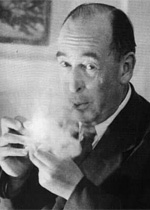 Here’s a followup of sorts to our first piece of C.S. Lewis verse, written “against too many writers of science fiction.” Despite being a rather successful science fiction writer himself, Lewis had a dark view of supposed scientific progress in general, as is clear from this pessimistic look into the future of space travel. Fans of Lewis’ more religiously-minded literature might be surprised at his frank imagery, but he wasn’t as shy about certain things as his readers. As with the previous installment, this bit of verse is available in his Poems collection.
Here’s a followup of sorts to our first piece of C.S. Lewis verse, written “against too many writers of science fiction.” Despite being a rather successful science fiction writer himself, Lewis had a dark view of supposed scientific progress in general, as is clear from this pessimistic look into the future of space travel. Fans of Lewis’ more religiously-minded literature might be surprised at his frank imagery, but he wasn’t as shy about certain things as his readers. As with the previous installment, this bit of verse is available in his Poems collection.
Prelude to Space
An EpithalamiumSo Man, grown vigorous now,
Holds himself ripe to breed,
Daily devises how
To ejaculate his seed
And boldly fertilize
The black womb of the unconsenting skies.Some now alive expect
(I am told) to see the large,
Steel member grow erect,
Turgid with the fierce charge
Of our whole planet’s skill,
Courage, wealth, knowledge, concentrated will;Straining with lust to stamp
Our likeness on the abyss—
Bombs, gallows, Belsen camp,
Pox, polio, Thais’ kiss
Or Judas’, Moloch’s fires
And Torquemada’s (sons resemble sires).Shall we, when the grim shape
Roars upward, dance and sing?
Yes: if we honour rape,
If we take pride to fling
So bountifully on space
The sperm of our long woes, our large disgrace.
Porte on Poems
It looks like we’re not the only ones to try to class up this roughneck joint. Rebecca Ariel Porte has written an article on io9 about the best science fiction-oriented poetry:
I’ve really done it now. I’ve invoked a forbidden word: poetry. Purveyors of poetry are inherently suspect in most circles. We are seen as a cross between broccoli-pushers (“Try it, you’ll like it!”) and emissaries from the imperial courts of high culture come to impose our foreign customs on the subjugated masses….
Of course there are scifi readers who already really like poetry—and poetry readers who really like scifi—but we tend to exist (however passionate we are about our sestinas and our ray-guns) in the fringes of both communities.
She makes a good argument for reading poetry before going on to make recommendations, and I have to admit that I’d heard of none of them before reading this article. After breezing past classic genre poets like Lucretius and Tolkien, she moves on to more modern verse. I did rather enjoy this excerpt from A. Van Jordan’s “The Superposition of the Atom” in Quantum Lyrics that Porte included in her piece, if only because of the superhero references:
the cat is forever dead
and alive. My phantom has existed for yearsin limbo, believing life would be more
pastel if he were paying the bills,sweating through rejection,
or figuring out what tie to wearas Ray Palmer. I never know
if he’s there or not, until jealousygets the better of him and he comes
out of paradox into a scene,for which, there is no future.
I’ve got more books to add to my reading list, now.
Bilbo’s Last Song
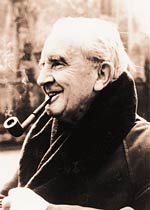 As part of our ongoing effort to underscore the classier side of genre literature, we continue our Genre Poetry series with a selection from J.R.R. Tolkien.
As part of our ongoing effort to underscore the classier side of genre literature, we continue our Genre Poetry series with a selection from J.R.R. Tolkien.
Bilbo’s Last Song (At the Grey Havens)
by J.R.R. TolkienDay is ended, dim my eyes,
But journey long before me lies.
Farewell, friends! I hear the call.
The ship’s beside the stony wall.
Foam is white and waves are grey;
beyond the sunset leads my way.
Foam is salt, the wind is free;
I hear the rising of the sea.Farewell, friends! The sails are set,
the wind is east, the moorings fret.
Shadows long before me lie,
beneath the ever-bending sky,
but islands lie behind the Sun
that I shall raise ere all is done;
lands there are to west of West,
where night is quiet and sleep is rest.Guided by the Lonely Star,
beyond the utmost harbour-bar,
I’ll find the heavens fair and free,
and beaches of the Starlit Sea.
Ship my ship! I seek the West,
and fields and mountains ever blest.
Farewell to Middle-earth at last.
I see the star above my mast!
Gaiman’s Apocalypse
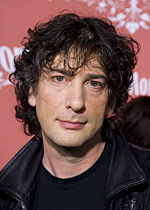 This week’s entry in our ongoing Genre Poetry series comes from Neil Gaiman’s short story and poetry collection, Fragile Things. What would happen if every genre-spawned apocalypse hit us at once? Would we even notice, or would we finally reach Patton Oswalt’s Etewaf Singularity?
This week’s entry in our ongoing Genre Poetry series comes from Neil Gaiman’s short story and poetry collection, Fragile Things. What would happen if every genre-spawned apocalypse hit us at once? Would we even notice, or would we finally reach Patton Oswalt’s Etewaf Singularity?
The Day the Saucers Came
by Neil GaimanThat day, the saucers landed. Hundreds of them, golden,
Silent, coming down from the sky like great snowflakes,
And the people of Earth stood and
stared as they descended,
Waiting, dry-mouthed, to find what waited inside for us
And none of us knowing if we would be here tomorrow
But you didn’t notice it becauseThat day, the day the saucers came, by some coincidence,
Was the day that the graves gave up their dead
And the zombies pushed up through soft earth
or erupted, shambling and dull-eyed, unstoppable,
Came towards us, the living, and we screamed and ran,
But you did not notice this becauseOn the saucer day, which was the zombie day, it was
Ragnarok also, and the television screens showed us
A ship built of dead-men’s nails, a serpent, a wolf,
All bigger than the mind could hold,
and the cameraman could
Not get far enough away, and then the Gods came out
But you did not see them coming becauseOn the saucer-zombie-battling-gods
day the floodgates broke
And each of us was engulfed by genies and sprites
Offering us wishes and wonders and eternities
And charm and cleverness and true
brave hearts and pots of gold
While giants feefofummed across
the land, and killer bees,
But you had no idea of any of this becauseThat day, the saucer day the zombie day
The Ragnarok and fairies day, the
day the great winds came
And snows, and the cities turned to crystal, the day
All plants died, plastics dissolved, the day the
Computers turned, the screens telling
us we would obey, the day
Angels, drunk and muddled, stumbled from the bars,
And all the bells of London were sounded, the day
Animals spoke to us in Assyrian, the Yeti day,
The fluttering capes and arrival of
the Time Machine day,
You didn’t notice any of this because
you were sitting in your room, not doing anything
not ever reading, not really, just
looking at your telephone,
wondering if I was going to call.
H.P. Lovecraft: A Bit of a Pessimist
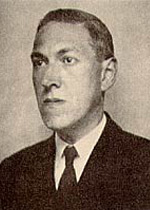 As part of our ongoing effort to underscore the classier side of genre literature, we’ve decided to keep pushing forward with our Genre Poetry series. We may be well out of the Month of Horrors, but that provides no safety from Friday the 13th! In keeping with the day’s traditional fears, this installment of Genre Poetry comes from the American patriarch of horror himself, H.P. Lovecraft, writing about what he knows best…
As part of our ongoing effort to underscore the classier side of genre literature, we’ve decided to keep pushing forward with our Genre Poetry series. We may be well out of the Month of Horrors, but that provides no safety from Friday the 13th! In keeping with the day’s traditional fears, this installment of Genre Poetry comes from the American patriarch of horror himself, H.P. Lovecraft, writing about what he knows best…
Despair
by H.P. LovecraftO’er the midnight moorlands crying,
Thro’ the cypress forests sighing,
In the night-wind madly flying,
Hellish forms with streaming hair;
In the barren branches creaking,
By the stagnant swamp-pools speaking,
Past the shore-cliffs ever shrieking;
Damn’d daemons of despair.Once, I think I half remember,
Ere the grey skies of November
Quench’d my youth’s aspiring ember,
Liv’d there such a thing as bliss;
Skies that now are dark were beaming,
Gold and azure, splendid seeming
Till I learn’d it all was dreaming—
Deadly drowsiness of Dis.But the stream of Time, swift flowing,
Brings the torment of half-knowing—
Dimly rushing, blindly going
Past the never-trodden lea;
And the voyager, repining,
Sees the wicked death-fires shining,
Hears the wicked petrel’s whining
As he helpless drifts to sea.Evil wings in ether beating;
Vultures at the spirit eating;
Things unseen forever fleeting
Black against the leering sky.
Ghastly shades of bygone gladness,
Clawing fiends of future sadness,
Mingle in a cloud of madness
Ever on the soul to lie.Thus the living, lone and sobbing,
In the throes of anguish throbbing,
With the loathsome Furies robbing
Night and noon of peace and rest.
But beyond the groans and grating
Of abhorrent Life, is waiting
Sweet Oblivion, culminating
All the years of fruitless quest.
(Thanks to the H.P. Lovecraft Archive for hosting this and so many other works from the author.)
An Expostulation on Mundane Science Fiction
 Though known most of all for his Narnia and Cosmic Trilogy works of fiction, C.S. Lewis was also an avid writer of poetry, much of which apparently remained unpublished during his life. As I was browsing through his Poems collection, I came across one such piece of verse that I thought deserved to be shared on the site, as it is a rather insightful critique of many popular forms of science fiction.
Though known most of all for his Narnia and Cosmic Trilogy works of fiction, C.S. Lewis was also an avid writer of poetry, much of which apparently remained unpublished during his life. As I was browsing through his Poems collection, I came across one such piece of verse that I thought deserved to be shared on the site, as it is a rather insightful critique of many popular forms of science fiction.
An Expostulation
Against too many writers of science fiction
Why did you lure us on like this,
Light-year on light-year, through the abyss,
Building (as though we cared for size!)
Empires that cover galaxies
If at the journey’s end we find
The same old stuff we left behind,
Well-worn Tellurian stories of
Crooks, spies, conspirators, or love,
Whose setting might as well have been
The Bronx, Montmartre, or Bethnal Green?Why should I leave this green-floored cell,
Roofed with blue air, in which we dwell,
Unless, outside its guarded gates,
Long, long desired, the Unearthly waits
Strangeness that moves us more than fear,
Beauty that stabs with tingling spear,
Or Wonder, laying on one’s heart
That finger-tip at which we start
As if some thought too swift and shy
For reason’s grasp had just gone by?
Fire or Ice?

Some say the world will end in fire,
Some say in ice.
From what I’ve tasted of desire
I hold with those who favor fire.
But if it had to perish twice,
I think I know enough of hate
To say that for destruction ice
Is also great,
And would suffice.
– Robert Frost
As you may or may not know by now, today is the last day…. ever. At least, that’s what Harold Camping and the Family Radio network have been preaching since the last armaggedon failed to appear in 1994. Since this may be our final blog post on this earth, we thought it might be a good time to remember other predictions of our impending doom. Perhaps we can finally settle the question posed by the good Robert Frost a mere 88 years ago. Will the world end in fire or ice?
First up: Walter Miller. His Hugo winning novel A Canticle for Leibowitz is a personal favorite of mine (as you can tell from my avatar). In it, the world undergoes a nuclear holocaust, plunging humanity back into the dark ages where the only shreds of written knowledge are preserved by ascetic monks in the southwestern deserts of North America. 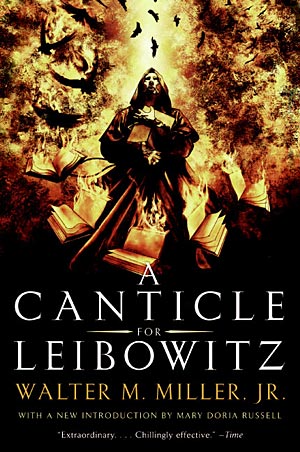 This classic features not one but two armageddons, illustrating the futility of technological conflict. He wrote the book as a sort of penance for his involvement in the destruction of Montecassino during World War II. The event left such a scar on his psyche that only beating out this masterpiece could quell it. Miller’s vote: FIRE.
This classic features not one but two armageddons, illustrating the futility of technological conflict. He wrote the book as a sort of penance for his involvement in the destruction of Montecassino during World War II. The event left such a scar on his psyche that only beating out this masterpiece could quell it. Miller’s vote: FIRE.
Jack Vance invented the “Dying Earth” sub-genre with his novel, The Dying Earth. Unrecognized in his time, the trendsetting novel has been named one of The Classics of Science Fiction and is included in the Fantasy Masterworks list by the Orion Publishing Group. This Earth of the distant future revolves around a red giant that is inexorably dying out. Like the sun, the human race is also a dim reflection of its former self, relying on the remnants of forgotten technology and magic. 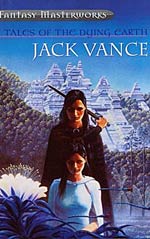 Vance was known for the mixing of science fiction and fantasy, and the trope of a massive but cooling sun dominating a now red sky provides a fantastic backdrop for both genres. Though the planet is not quite destroyed in this 1960’s series, its inevitable fate is known. Jack Vance votes ICE. (P.S.: I’ve always wondered whether Jack Vance was the inspiration for Vance Refrigeration in The Office.)
Vance was known for the mixing of science fiction and fantasy, and the trope of a massive but cooling sun dominating a now red sky provides a fantastic backdrop for both genres. Though the planet is not quite destroyed in this 1960’s series, its inevitable fate is known. Jack Vance votes ICE. (P.S.: I’ve always wondered whether Jack Vance was the inspiration for Vance Refrigeration in The Office.)
Rarely do we get to see the Earth actually die in a science fiction novel. Sure, it might sustain a few nuclear wars or a couple of extinction events, but it’s hard to continue a story when all of your characters are dead. You can imagine my delight, then, when I re-read H.G. Wells‘ The Time Machine. Sure, everyone rememebers the Morlocks and the Eloi. You might still have a few whispy dreams of the lovely Weena, the Time Travellers demure girlfriend from the year 802,701 A.D. What I forgot, however, was the protagonists final trip to the ends of the Earth (literally). For those who are a little foggy on the details, we’ll fill you in. After rescuing his shorty, the Time Traveller travels another 30 million years into the future, where he witnesses crabs and butterflies sparsely inhabiting blood-red world of simple vegetation. A few jumps later gives us the answer we seek: the Earth’s rotation stops and the sun shrinks away until the earth and everything in it sets in for a deep freeze. For Mr. Wells, that’s a definite ICE.
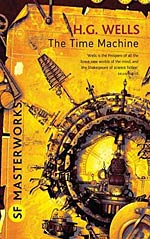
A few other WWEnd author votes include:
Gene Wolfe votes ICE with his classic series, The Book of the New Sun, which describes an “Urth” in a distant future whose sun is dying.
The great Larry Niven begs FIRE in a big way with Lucifer’s Hammer, where the planet gets smacked with a (near) extinction event in the form of an asteroid.
If you want a definitive answer to the way the world ends, you can’t get any closer than This is the way the World Ends, by James Morrow. He nabbed nominations for both the Nebula and Campbell awards, casting his vote for FIRE by way of a nuclear war.
This leaves us with a tie of 3-3, but what do I know? I just picked six books at random. Please add to the list by citing your favorite WWEnd authors, or even authors not yet in our database. Hell, cast your own vote. We just need to break this tie. Please hurry, though. We only have until 6PM before the latest scheduled apocalypse.



















 Full Details
Full Details
